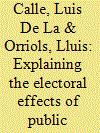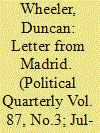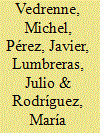|
|
|
Sort Order |
|
|
|
Items / Page
|
|
|
|
|
|
|
| Srl | Item |
| 1 |
ID:
107158


|
|
|
|
|
| Publication |
2011.
|
| Summary/Abstract |
In 2004, an al Qaeda affiliate killed 191 civilians in Madrid. Spain's general election three days later confounded pollsters' expectations; the incumbent Partido Popular was ousted by the challenging Partido Socialista Obrero Español ( psoe ), a party committed to withdrawal from Iraq. This manuscript examines the notion that this was a strategic terrorist success. The first strategic form considered is coercive bargaining. The paper finds that al Qaeda is not a credible coercive agent and debunks the popular myth that Spanish voters entered a coercive bargain with the network. The paper also considers the attacks through the strategic frameworks of terrorist advertising, provocation, regime destabilization, and morale building. It finds that the attacks' only strategic achievement was building morale. Finally, the paper provides a multi-factor explanation of how the Madrid bombings contributed to the psoe victory despite their lack of strategic impact. The upshot of the analysis is that there is little reason to believe such electoral impact is replicable.
|
|
|
|
|
|
|
|
|
|
|
|
|
|
|
|
| 2 |
ID:
094982


|
|
|
|
|
| Publication |
2010.
|
| Summary/Abstract |
According to the literature, governments have strong incentives to use the public budget tactically in order to either obtain the electoral support of new voters or strengthen the loyalty of their traditional supporters. Yet vote-seeking strategies only become rational when voters follow their self-interest and reward governments when their constituency benefits from public transfers. The literature has focused on the governments' incentives, largely ignoring the importance of knowing whether the electorate is responsive to public investments. This study tests empirically whether incumbents strategically use public investments to gather more electoral support; and whether voters take these investments into account at the polls. These two questions are pursued simultaneously by using as a case study the expansion of the underground network in Madrid, Spain. Only a little evidence is found to support the idea that regional governments constructed new metro stations in neighbourhoods where they had more to gain electorally. Also, the inauguration timing strictly followed the electoral cycle, something that indicates a strategic calculus on the part of the incumbent. However, the models are also consistent with the idea that the government's investments were primarily driven by motives of efficiency. Indeed, although governments are tempted to follow vote-seeking strategies, they are also aware that they cannot deviate too much from an efficiency-based allocation of public resources. From the perspective of the voters, robust evidence has been found to show that regional voters rewarded this policy at the neighbourhood level. Neighbourhoods that received new metro stations voted in higher numbers for the incumbent than those quarters without new investments. All in all, these findings may have some implications for normative democratic theory.
|
|
|
|
|
|
|
|
|
|
|
|
|
|
|
|
| 3 |
ID:
149202


|
|
|
|
|
| Summary/Abstract |
Spain finds itself at an impasse: currently without government, no immediate solution is in sight. Mariano Rajoy and his right-of-centre Partido Popular/Popular Party (PP) received more votes than any other political formation at the general elections held on 20 December 2015, but were significantly short of an absolute majority; even if their MPs had been pooled with those of Ciudadanos—the most market-driven of the recent political start-ups—this would be insufficient to form a government, and none of the other major political parties were willing to play ball with a leader who has behaved in a self-interested, corrupt and authoritarian manner since his election in 2011. The Partido Socialista Obrero Español/Spanish Socialist Workers' Party (PSOE), under the leadership of the physically attractive but seemingly insubstantial Pedro Sánchez then had the opportunity to form their own coalition, but negotiations were far from straightforward.
|
|
|
|
|
|
|
|
|
|
|
|
|
|
|
|
| 4 |
ID:
127898


|
|
|
|
|
| Publication |
2014.
|
| Summary/Abstract |
This paper examined the potentialities of Life Cycle Assessment (LCA) as instrument for policy-support. To this respect, the adoption of an initiative within the Madrid Air Quality Plan (AQP) 2011-2015 regarding the substitution of diesel taxis with hybrid, natural gas and LPG alternatives was studied. Four different scenarios were elaborated, a business-as-usual scenario (BAU), the scenario of the AQP, and two extreme-situation scenarios: all-diesel (ADI) and all-ecologic (AEC). Impacts were characterized according to the ILCD methodology, focusing especially on climate change (CC) and photochemical ozone formation (PO). SimaPro 7.3 was used as analysis and inventory-construction tool. The results indicate that the shift to ecologic alternatives reduced impacts, especially those related to CC and PO. For the complete life cycle, reductions of 13% (CC) and 25% (PO) were observed for AQP against BAU (CC:1365 GgCO2, PO:13336 MgNMVOC). Deeper reductions were observed for AEC (CC:34%, PO:59%), while ADI produced slight increases in impacts if against BAU. The analysis of the use-phase revealed that the central and highest speed zones of the city benefit from the adoption of AQP. This is especially evident in zone 7, with reductions of 16% in CC and 31% in PO respectively against BAU (CCzone1:3443 kgCO2/veh·km, POzone7:11.1 kgNMVOC/veh·km).
|
|
|
|
|
|
|
|
|
|
|
|
|
|
|
|
|
|
|
|
|